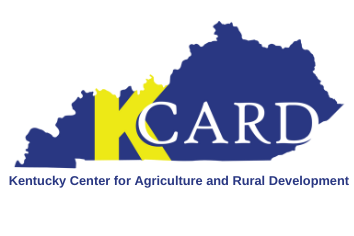Growing a Cooperative: Central Kentucky Growers Association
Central Kentucky Growers Association (CKGA) began in 1998 as a vegetable marketing cooperative when a small group of growers decided to diversify away from tobacco, which had been a mainstay on farms in the area. The new focus of their efforts was on horticulture production.
“I began growing pumpkins for the co-op in ‘98 or ’99, I believe,” says Kevan Evans, owner of Evans Orchard. “I had already begun transitioning away from tobacco into vegetable and fruit production, selling at farmers markets and from a small farm market. Becoming a member of the co-op gave me another marketing option to expand my horticulture production before we really started to grow our agri-tourism business: Evans Orchard.”
The co-op became a key marketing outlet for current CKGA president, Zeldon Angel. He began producing horticulture products as he saw the change looming for Kentucky’s tobacco industry. As a co-op member, Zeldon has worked closely with the management to help identify new marketing opportunities for the co-op.
“Over the years, we have tried almost every marketing approach that exists,” says Zeldon. “Some have worked, and others haven’t. But we have always been open to hear new ideas.”
Currently CKGA is working with Castellini and Cabbage Inc. to market co-op products. The primary crops for CKGA are cucumbers and peppers – which can be packaged across the processing line at its facility – but it has also had success with green beans and producing cabbage under contract for Cabbage Inc., a fresh produce company based in Sheffield Lake, Ohio.
“In the early years our members had to step up financially to get the co-op going,” explains Zeldon. “Over the years, we have seen that level of financial commitment from our members and the community. It has been that determination that kept us going even when other co-ops were closing the doors.”
Seed money helps co-op expand
In 2001, CKGA received a boost when it was awarded nearly $500,000 in Kentucky Agricultural Development Funds for the purchase of equipment and market development. These funds allowed CKGA to work with more growers and buyers.
Soon, the growing co-op was in need of another expansion. In 2003, the group received an additional $300,000 to update a production line, expand to year-round marketing, and to meet the needs of new and existing growers.
Kevan admits that the funds from the Ag Development Board were critical to the early development and growth of CKGA. But serving as current secretary and one time president of the co-op, Kevan also recognizes that there were challenges the group faced in those early years with inexperienced members, production, retaining buyers and general management issues that needed more than just money to fix.
“One of our biggest issues was the tobacco mentality,” said Zeldon. “The thought was that if we grow it, there is a market for it; but it is not that way in the vegetable business.”
Kevan and Zeldon both point to CKGA’s involvement with the Kentucky Center for Agriculture and Rural Development (KCARD) as the key factor to helping the organization overcome the challenges along the way.
“In 2005, we were struggling with several issues at the co-op and went back to the Ag Development Board for funding assistance; we received about $121,000 as a forgivable loan to stabilize management and purchase necessary equipment,” explained Zeldon. “Yet, what made the difference with this round of funding was that we began working with Larry Snell [KCARD executive director] and KCARD to get a handle on financials.”
Zeldon explains that working with KCARD helped the CKGA board of directors realized what needed to done each year to make accurate projections about how to run the business. They followed KCARDs recommendation and brought in an outside company in 2006 to run the business for a year to give them ideas on management.
“When we began working with KCARD, we were in the red. But Larry and the staff just kept working with us on what we needed to do on the financial side to get a better handle on things and to make accurate projections so we could pull enough out to balance the budget,” says Zeldon. “Between the determination and willingness to sacrifice on our guy’s part and KCARD’s dedication to work with us we were able to pull out of the red.”
Strong working relationship with KCARD
Since that experience, the co-op has continued to work with KCARD periodically to review finances, polices and general management. Recently, the group had to turn to KCARD once again as it met with the Agriculture Development Board to review the terms of the forgivable loan.
“If we hadn’t worked with KCARD during this evaluation of our agreement with ADB, then the deal probably wouldn’t have gotten done,” Zeldon says. “KCARDs knowledge of the industry and the fact that they were working with us to address the terms of the agreement brought to the table a level of credibility that helped us to achieve a workable agreement.”
“The major strength of CKGA is the leadership and unwavering commitment of its board of directors over the years,” says Snell. “They are determined that the cooperative will succeed and provide a reliable market for commercial vegetable growers in Central Kentucky.”
Zeldon realizes there will continue to be challenges for CKGA. This year the major challenge has been the weather. Dry, hot conditions have made it difficult for the group to produce quality products to take to the market. But he believes that the commitment to the CKGA remains.
“As much hard work as we have all put into the co-op, I hope we are still going strong in five to ten years,” says Zeldon. “We want to make it self-sustaining and keep it going. It will work, but we just need to find a few more growers who are willing to make the sacrifices to produce a quality product for the market.”
Article originally published in October 2012.

